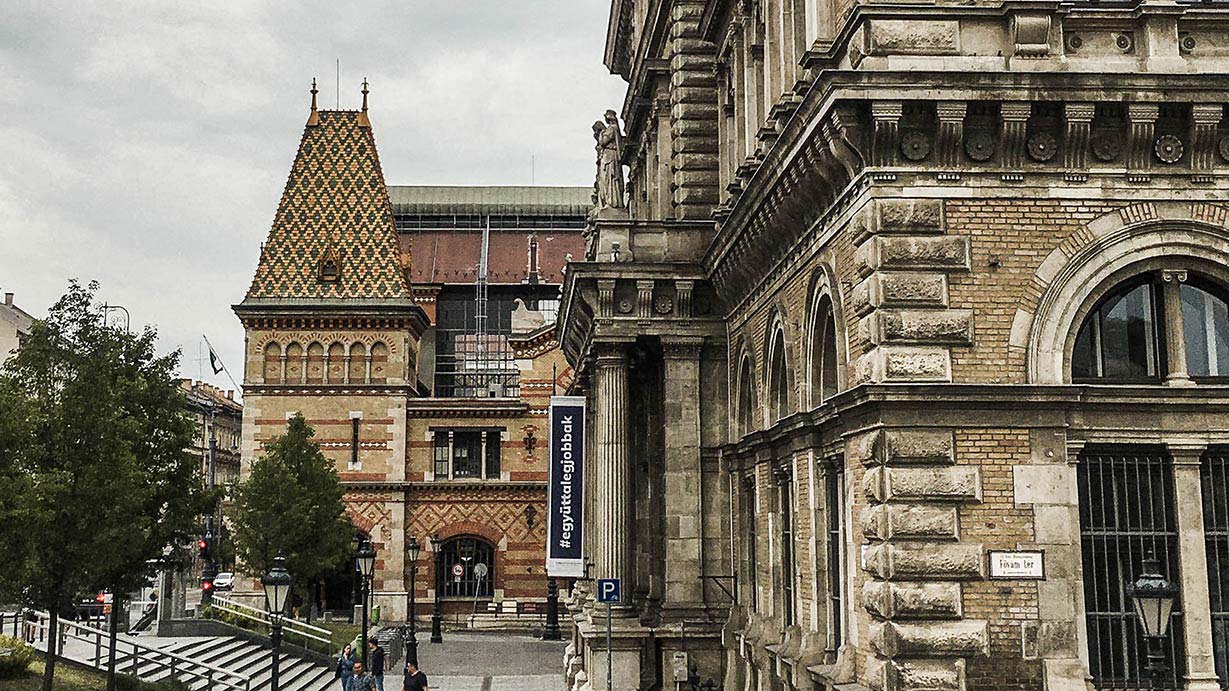The need for a more humane economy becomes more urgent

In an unusual way, the 20th conference of the European SPES (Spirituality in economics and society) Institute, organized this year by the Corvinus’ Business Ethics Center together with several international partner universities, started with a few minutes of silence in front of a projected portrait of St. Francis of Assisi. The conference called for the human race to enter the Anthropocene era of Earth’s history, at a critical point where the survival of civilisation is at stake. Climate change, the collapse of ecosystems and growing global inequalities all contribute to this process. The presentations at the conference addressed, among other things, the question of what possibilities there are to reverse this process, for example by reducing consumption, by adopting a more environmentally conscious approach and by living more harmoniously with nature.
The participants were welcomed by Zoltán Oszkár Szántó, Vice-Rector for Research, who expressed his pleasure that Corvinus University could host so many outstanding international researchers, as researchers from all over the world, from the USA to India, came to the jubilee occasion. He added that Corvinus, with its 50 research centres and 150 research projects, is committed to international research collaborations. The Vice-Rector also said that the Corvinus Institute of Advanced Studies, an interdisciplinary research institute, plays a catalytic role in the internationalisation process of the university, regularly offering international guest researcher scholarships in four categories, thus providing all the tools for in-depth research and the creation of outstanding international publications.
Zoltán Oszkár Szántó’s welcome speech was followed by a plenary lecture by László Zsolnai and András Ócsai, in which the two researchers presented the economic philosophy of St Francis of Assisi and Pope Francis’ initiative to reduce consumerism and seek harmony with nature.
Saint Francis of Assisi was particularly hostile to money and the possession of material goods. Instead, he promoted a puritanical, spiritually rich, close-to-nature life and the importance of community service. He was also opposed to participating in market activity.
-explained László Zsolnai.
The researcher added that a whole range of psychological research has now proven that people who prioritise material goods in their lives are more prone to manipulative, competitive and environmentally destructive behaviour. This attitude also has a negative impact on their personal well-being, and therefore the excessive pursuit of material goods leads to unhappiness.
In a book published in 2015, This Economy Kills, Pope Francis argued that the modern economy is inherently competitive and violent, working against life, bringing millions of people into poverty and destroying natural systems. Pope Francis was inspired by St Francis of Assisi when he published his encyclical Laudato si’ (‘Blessed be’ – a quote from St Francis of Assisi) in the summer of 2015. In it, he calls for a complete change of attitude: to value the little things in life, to reduce consumption, to protect nature by producing less rubbish and not following the ‘use it, throw it away and buy new’ attitude of modern societies. Pope Francis, following the example of St Francis of Assisi, invites his flock to acknowledge the self-worth of natural beings, to contemplate the beauty of nature and to quieten the mind and soul. As markets were also created by people, the Pope said that with the right determination and will, the economy can be transformed into a people- and nature-friendly economy. This requires the development of new business models that focus on helping the poor, protecting nature or even creating jobs based on humane principles. András Ócsai cited the example of Patagonia, a sports and leisurewear company based in the State of California, which donates 1% of its annual sales to the environment.
The researcher also said that Pope Francis’ encyclical was later followed up by concrete action, not just a manifesto. The Corvinus Business Ethics Center, together with several researchers and specialists, participated in the 2022 World Conference in Assisi, where participants started to work on the possibilities of new human-centred business operating models. András Ócsai defined the initiative of Pope Francis as an ‘economy of hope’, which, thanks to the Pope’s persuasive power, can bring about real change in the economy and society.
The three-day conference continued with different sessions after the plenary session. In the framework of the programme, the new book of Péter Róna, Oxford University researcher, Homo Curator: Towards the Ethics of Consumption was also launched.